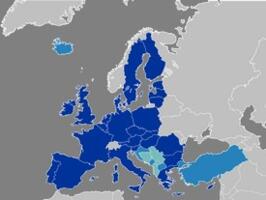'Austerity' Talk Is Just Political Cover for More Government Spending
A Commentary By Scott Rasmussen
President Obama, new French President Francois Hollande and other political leaders have called for less "austerity" as a way to help the troubled economies on both sides of the Atlantic. That's the polite way of saying they want more government spending and larger deficits.
But U.S. voters have a fundamentally different view. Sixty-one percent believe that cutting government spending is what those ailing European economies need. Just 20 percent agree with the political leaders.
Not surprisingly, American voters think that the same prescription is needed closer to home. Most believe cuts in government spending help the economy and an increase in government spending will hurt.
The entire debate is clouded by a refusal of political leaders to talk honestly about spending. The air is filled with talk of brutal spending cuts in financially troubled Europe, but Veronique de Rugy of the Mercatus Center, a pro-free market U.S. think tank, has shown that to be a lie. The growth of spending may have slowed, but there have been no significant cuts in spending in France, England, Italy or Spain. There have been cuts in Greece primarily because nobody will loan the government money. But even that troubled country is spending more than it did just a few years ago.
In the United States, government spending has increased every single year since 1954. But in my book "The People's Money," I show that voters are quite willing to make the changes needed to reverse that trend, balance the budget and eliminate the federal debt. The only thing standing in the way is a political class committed to pursuing its own agenda rather than listening to voters.
That brings us back to the word "austerity." It sounds ominous when political leaders talk of nations on an austerity budget.
But it's important to recognize that there is a difference between a nation and its government. Every dollar that is spent by the government is a dollar that can't be spent by individuals, businesses or charitable organizations. So those who want to eliminate austerity for governments are really saying they want to impose austerity on the private sector.
Many political leaders around the globe believe that higher taxes are needed to keep the government spending machine going. That's a direct way of imposing austerity on the private sector. Others think that governments should simply increase already large deficits. That's a way to impose austerity on future generations. It's also one reason that just 16 percent believe today's children will be better off than their parents.
Ultimately, in the United States, government spending will come down because voters have made it clear that's what they want. Politicians will bemoan the austerity budgets, but most voters will see them in a different light.
Two out of three Americans believe decisions made by business leaders will do more to create jobs than decisions made by those in government. Cutting government spending is seen by voters as a way to free more resources for the private sector. In other words, austerity for the government leads to prosperity for the nation.
COPYRIGHT 2012 SCOTT RASMUSSEN
DISTRIBUTED BY CREATORS.COM
See Other Political Commentaries.
See Other Commentaries by Scott Rasmussen.
Rasmussen Reports is a media company specializing in the collection, publication and distribution of public opinion information.
We conduct public opinion polls on a variety of topics to inform our audience on events in the news and other topics of interest. To ensure editorial control and independence, we pay for the polls ourselves and generate revenue through the sale of subscriptions, sponsorships, and advertising. Nightly polling on politics, business and lifestyle topics provides the content to update the Rasmussen Reports web site many times each day. If it's in the news, it's in our polls. Additionally, the data drives a daily update newsletter and various media outlets across the country.
Some information, including the Rasmussen Reports daily Presidential Tracking Poll and commentaries are available for free to the general public. Subscriptions are available for $4.95 a month or 34.95 a year that provide subscribers with exclusive access to more than 20 stories per week on upcoming elections, consumer confidence, and issues that affect us all. For those who are really into the numbers, Platinum Members can review demographic crosstabs and a full history of our data.
To learn more about our methodology, click here.




